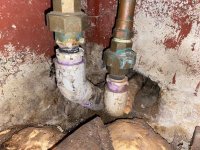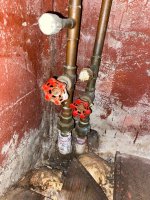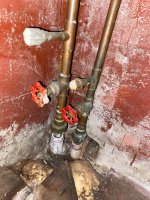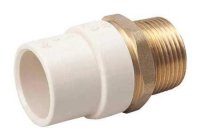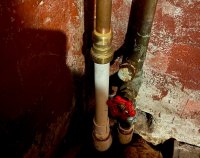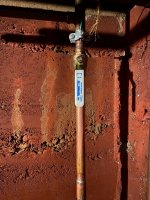Deathtofishy
Member
Hello,
I have a duplex that currently has two 1" PVC lines coming from the meter, reduced down to a 3/4" female thread that is connected with a union to the 3/4" copper main lines in the units. (see photos).
One of the supply's has a small leak at the union that I'm planning on addressing. I'm wondering if the union is necessary? or if I can just go from the female PVC to a copper male thread with T plus 2 thread sealant.
I feel like the union is just another point of potential failure and doesn't add much benefit?
At the same time, I'm also planning on replacing the gate valves with ball valves.
It also looks like they put on air chambers for hammer arrestors above? unless these were just stub outs for potential future additions? Seems like a odd location as I thought hammer arrestors were suppose to be near each fixture?
If they are air chambers, I'm assuming I should replace them with actual hammer arrestors. The units currently don't exhibit any water hammer that I am aware of.
Thanks in advance
I have a duplex that currently has two 1" PVC lines coming from the meter, reduced down to a 3/4" female thread that is connected with a union to the 3/4" copper main lines in the units. (see photos).
One of the supply's has a small leak at the union that I'm planning on addressing. I'm wondering if the union is necessary? or if I can just go from the female PVC to a copper male thread with T plus 2 thread sealant.
I feel like the union is just another point of potential failure and doesn't add much benefit?
At the same time, I'm also planning on replacing the gate valves with ball valves.
It also looks like they put on air chambers for hammer arrestors above? unless these were just stub outs for potential future additions? Seems like a odd location as I thought hammer arrestors were suppose to be near each fixture?
If they are air chambers, I'm assuming I should replace them with actual hammer arrestors. The units currently don't exhibit any water hammer that I am aware of.
Thanks in advance

